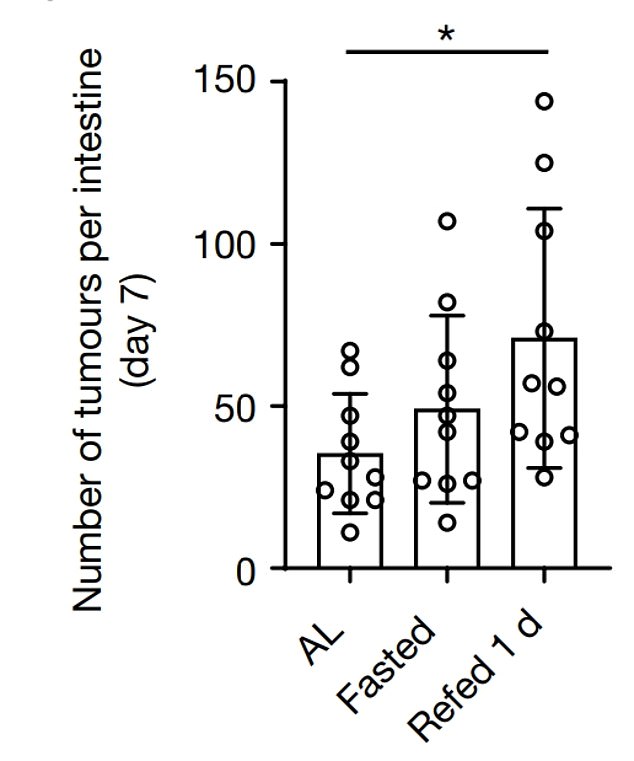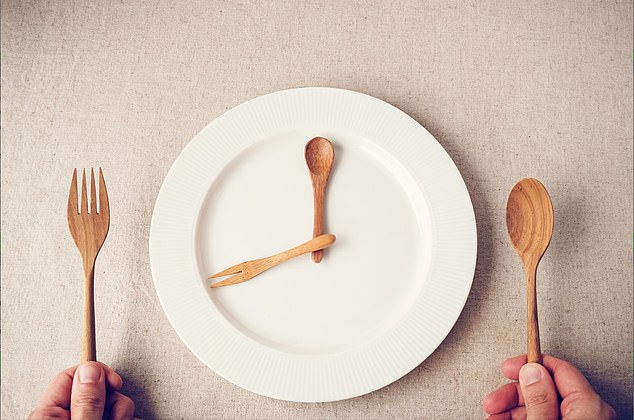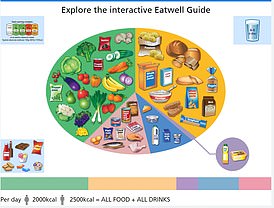How intermittent fasting may raise risk of colon CANCER and the foods you should avoid on the diet
Preliminary research suggests that intermittent fasting may increase the risk of colon cancer.
A study in mice found that rodents that fasted for 24 hours before eating were at “high” risk of developing pre-cancerous lesions in their intestines.
This may be because the ‘refeeding’ phase causes cells in the gut to become overactive, increasing the risk of cancer-causing mutations.
Dr. Omer Yilmaz, a biologist at MIT who led the study, cautioned that it was not done in humans and so could not be directly compared to people.
But he said the results suggest that people trying intermittent fasting should avoid foods such as red meat and burnt steaks, which have increasingly been linked to the epidemic of colon cancer in young people..
Mark Wahlberg, 53, is one of those who swears by the diet: He only eats within a six-hour window, starting at noon each day. (Pictured above in Barbados in 2019)

This graph shows that the mice that fasted for 24 hours and then ate food were most likely to develop tumors in their intestines
Dr Yilmaz said: ‘I want to emphasise that this has all been done in mice, using very well-defined cancer mutations. In humans it will be a much more complex situation.
‘But it does lead us to the following conclusion: fasting is very healthy, but if you’re unlucky and you eat again after a fasting period and you’re exposed to a mutagen, like a burnt steak or something, then you actually increase the chance that you’ll develop a lesion that can cause cancer.’
There has been a health craze surrounding intermittent fasting since it became popular in the 2010s, with more than one in 10 Americans following the diet.
In this diet, a person restricts their calorie intake to certain hours of the day or days of the week, in order to lose weight and control their eating habits.
Popular variations include the 14:10 plan, where a person only eats within a 10-hour window, and the 5:2 plan, where a person eats five days a week and fasts two days.
One of the celebrities who swore by the diet was Jennifer Aniston. In 2019, she revealed that she only drinks water in the morning and saves her first meal until noon.
Mark Wahlberg is also a fan of the diet and limits himself to eating between 12pm and 6pm each day.
Many people are drawn to this diet for its benefits, with studies linking it to weight loss, improved concentration, and even longevity.
But Experts are now also beginning to discover a range of potential dangers associated with the diet.
Others claim the diet is harmful to the immune system and can increase the risk of infections and heart disease.
In the new article, published in the journal Naturescientists looked at three groups of mice.
One group fasted for 24 hours and then ate whatever they wanted, the other group fasted for 24 hours and then ate nothing, and the third group ate whatever they wanted the entire time.

Celebrity-endorsed fasting diets may increase the risk of heart disease and cancer, a separate study finds (stock photo)
During the experiment, the scientists also extracted stem cells from the intestines of the mice.
Intestinal stem cells are among the most active cells in the body, dividing rapidly and regularly to replace the intestinal lining every five to ten days.
They are also one of the most common sources of precancerous cells.
The results showed that cells multiplied fastest in the fasting group after the 24-hour fasting period was over.
In another experiment, the team then switched on cancer-causing genes, making the mice more likely to develop tumors.
They found that mice that fasted first and then ate were at greater risk of developing precancerous polyps in their intestines than mice that ate normally or only fasted.
Dr Shinya Imada, a biologist who was also involved in the study, added: ‘We think that fasting and refeeding are two different phases.
‘In the fasting state, cells can use lipids and fatty acids as an energy source, allowing them to survive when there is a shortage of nutrients.
‘And then it’s the postfast refeeding state that really drives regeneration.
‘When nutrients become available, these stem and progenitor cells activate programs that allow them to build cell mass and repopulate the intestinal lining.’

